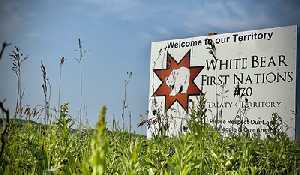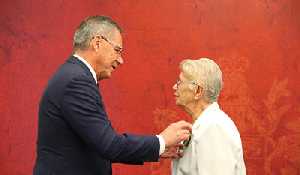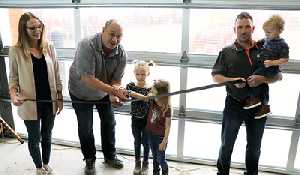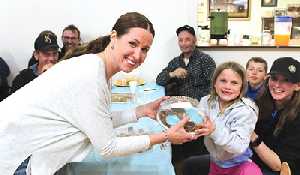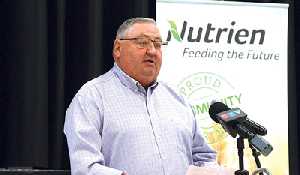Birkbeck safely out of Haiti
Tanya Birkbeck flew out of Haiti just before the airport was closed by gang violence
March 18, 2024, 11:06 am
Kevin Weedmark
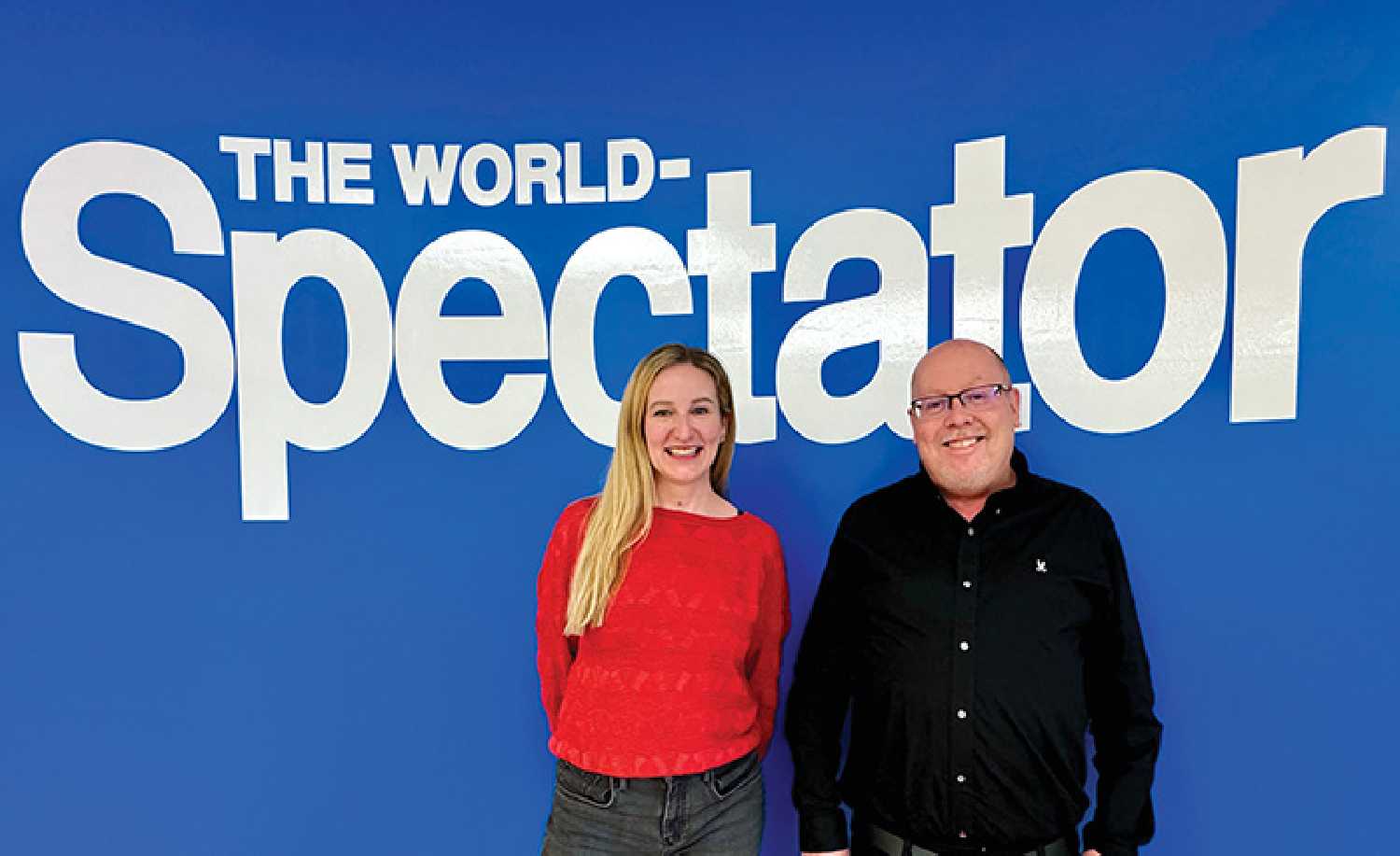

Tanya Birkbeck, who works with the World Food Organization in Haiti and who grew up in Welwyn, is safely out of Haiti.
Shortly after Birkbeck told her story to World-Spectator journalist Ashley Bochek, explaining the important work she does with the World Food Organization in the country, Haiti exploded into major unrest with criminal gangs attacking the airport in Port-au-Prince.
On Monday, March 11, the day the interview was published in the World-Spectator Birkbeck stopped by the World-Spectator office to let everyone know she is safe, and to provide an update before flying to Uganda.
She was home visiting her family in Welwyn, on a planned break from her duties in Haiti.
Birkbeck says she wishes she was still in Haiti, and the only reason she is no longer there is timing, with the airport attacks starting only two days after she left for a scheduled break.
“I’m a consultant, so that means that once a year I have to take a month break—it’s mandatory. It was just timing. It was a complete coincidence that my contract break was due and so I left,” she says. “Actually everything was totally normal at the airport when I left and then two days later was the first attempt of attacks at the airports. So I was watching that and was thinking, ‘okay we don’t really know where this is going to go’ at that point, but the situation has continued to degrade since then.
“So basically, if I hadn’t left when I did, I would still be stuck there. The staff, everybody who was still there in Port-au-Prince at that time, is stuck there. They’re sheltering in place and they’re doing okay.
“I’m in constant contact with them and for a lot of people who are outside of the country right now it’s a wait-and-see situation to see when people can go back or if they’ll go back to work maybe in the north of the country in Cap Haitien where there’s another international airport that’s accessible at this point. So some members of our team including our country director have gone to Cap Haitien. We have a field office there, so they’re functioning out of there and the staff in Port-au-Prince are sheltering in place. Everybody seems to be doing okay and they seem to be coping.”
Birkbeck says she is worried about her colleagues.
“Of course I’m worried about them. It’s not an easy situation and one of the most difficult parts of it is that you just don’t what’s going to happen,” she says. “You can’t plan when you’re going to leave—you have to be ready to go at any point but it could be two days, it could be two weeks, it could be two months. You don’t really know how long it’s going to be. So for a lot of people that have been in similar situations, I know that uncertainty can be really, really difficult. And the other thing that’s really hard, honestly, is that you really worry about your family at home—about them worrying about you. For my colleagues there, that’s what they’ve told me. They’re like, ‘We’re doing fine. We’re coping.’
“They’re really busy because the communications team is getting tons of media requests right now. Everybody wants to know what’s going on in Haiti. So I’m sure that they’re overwhelmed with work and you know, you just put your nose down and you do what you have to do, but then you’re really worried about your family at home and how they’re perceiving it and what they are getting from the news.
“You see the chaos on the street, and you worry about people there, but we’re not wandering through the streets. The only time we ever leave is in an armoured car and right now nobody is going to those areas. That’s not what my colleagues are experiencing, but they are experiencing a lot of uncertainty right now.”
Birkbeck says it’s not surprising that the security situation in Haiti has degraded so much, and security officials had predicted the current breakdown.
“We’ve known for quite some time. Our security team is analyzing the situation all the time and the security team is a very key part of the organization. We don’t do anything without doing a thorough security assessment before we move out on any mission within the country. So the security team is looking at it and it’s something that they predicted would happen—it was just a question of when. So what’s happening right now is not a surprise to me. Of course I’m saddened to see what’s happening. I’m saddened to see that there are people being killed on the street. I don’t know what the path is out of this but it’s not a total surprise.”
Is Birkbeck hopeful that there is some way forward for Haiti that will get the country past this difficult time?
“I think you always have to have hope,” she says. “I couldn’t do the kind of work that I’m doing if you don’t feel that there’s a path out somehow. Despite the huge challenges right now in logistics and security, WFP is still managing to provide hot meals for thousands of people who are displaced within Port-au-Prince. This is thanks to the network of local organizations that we work with. So every week, for the past couple of months, we’ve been seeing thousands of people being displaced within the capital and then in this most recent stint of violence, that’s been magnified. There’s even more. So we’ve continued to be able to deliver hot meals and that’s a stop gap. A hot meal is not a sustainable relief solution but it’s something that can provide people with the food that they need in an immediate sense.
“Also in rural areas we continue to work with farmers, we continue to work with farmers’ co-ops and we continue to work with schools so that we continue to provide school meals when it’s possible to the schools that are open. So even though the situation is extremely challenging, it’s not exactly the same situation across the country that it is in the capital. So in some areas movement is possible and being able to continue to support farmers, support local markets and provide meals is something that we can continue to do.
“I think that really the hope for the country just in terms of food security—which is the domain that I specifically work in—I think that the key is definitely to work with the farmers. People have this image of WFP bringing in bags of rice and beans from outside of the country and it’s true that it is a part of what we do, as Haiti is a country that’s dependant on food imports, but the real way to not only assure the food security of the country but to also protect the country from the effects of these shocks of—it could be of violence or it could be an extreme weather event—the way to protect the country from that is to have local production and to have locally accessible food.
“So if the road is blocked from Port-au-Prince and a city outside of the capital, there’s still a source of food. So I think that’s something that will resonate with a lot of people here. To have a strong local economy is really the key to helping the whole country. A humanitarian response is really important because if you don’t have food and you have people who are starving, that creates greater unrest.
“So we need to have a humanitarian response and we need to have work with the local farmers, but there does need to be a security solution as well, particularly in Port-au-Prince. That’s not my place to say what that might be, but the security situation does have to improve.”
Birkbeck says she is happy for her family’s sake that she is safely out of Haiti, but says, professionally and personally, she wishes she was there.
“In this particular moment I happen to be staying with my mom and dad, and for the sake of my mom and dad, I’m glad I’m here, because it’s really difficult to know that your family members are at home and watching this on TV,” she says, “But professionally and personally I wish that I was there because I know that whenever you’re in a moment of crisis like this, communication is super important. For our organization in particular, it’s really important for us, not only to make sure that the world knows what’s happening in Haiti right now but to also say, ‘Despite what’s happening we are able to continue. We still have a path forward in terms of improving the food security of this country.’
“So I wish that I was there to help my team, honestly. Personally I can’t wait to go back, but at the same time I’ve learned over the years that there are situations like this that are completely out of our control and so there’s nothing that I can do to get back faster. When the time comes and there’s the logistical capacity for me to do so, I know that the organization will make it happen, and for now I just have to sit tight and just support them however I can just over Whatsapp basically.”
Birkbeck says there are small ways she can help from outside the country.
“I can provide emotional support. I can ask ‘Do you need to talk?’ If they ever need words of encouragement or, for my colleagues that are there, if they want to bounce ideas off of me, of course I’m always available for that,” she says. “I’ve been taking an awful lot of media requests. Even this morning my Whatsapp is flashing—CNN wants to talk, BBC wants to talk—so of course I’m passing those on to my colleagues and making sure that all of the communication that I’m getting is passed on. Other than that it’s a bit difficult—just offer emotional support and help support them if they have any questions.”
Birkbeck says it’s not up to her to decide what happens next in terms of getting back to Haiti.
“It’s not my call. It’s completely out of my hands,” she says. “It’s something which, in the case of a crisis, there’s a crisis management team within the WFP but also within the UN as a whole. So these are decisions that are being made on another level from me and even sometimes outside of the organization itself, so there has to be an establishment of it being safe and it also has to be cost effective if you’re moving a lot of people—a logistical line to go back into the country. So sometimes the people who are there just have to sit tight and the people who are outside also have to sit tight and just be patient.”
With a month of leave, Birkbeck was planning to travel to Uganda and South Sudan for her holiday.
“Because I have so many contacts and so many friends there,” she says. “I know a young lady there and she has actually studied journalism. I met her at a radio station in South Sudan and she was in a difficult situation, to be married against her will and without her consent.
“So we did a crowd-funder maybe five or six years ago now, I topped it up, and we were able to send her to university in Uganda and she’s graduated with a Journalism degree.
“So she’s back in South Sudan now and she’s working at a marketing company and I’m enormously proud of her. I love her like a daughter. So, I want to go back and see her and see how she’s doing.”


